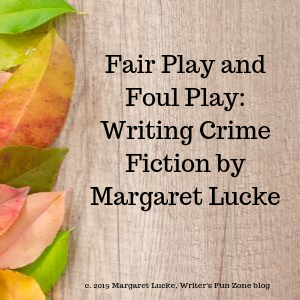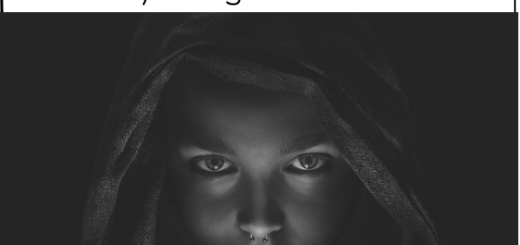Fair Play and Foul Play: Writing Crime Fiction by Margaret Lucke
 Today we welcome back author and teacher Margaret Lucke to chat about writing crime fiction and share about her upcoming course.
Today we welcome back author and teacher Margaret Lucke to chat about writing crime fiction and share about her upcoming course.
***
Do you like stories that are veiled in mystery? Is a cloak and dagger your favored fashion style? You might find rewards in taking up a life of crime—writing crime fiction, that is.
Crime fiction is one of the most popular and pleasurable forms of storytelling for writers and readers alike. It encompasses a wide range of stories: detective tales from cozy to hard-boiled, police procedurals, romantic suspense, thrillers and more. What they have in common is strong characters, page-turning plots and satisfying resolutions, with plenty of excitement and suspense along the way.
Writing Crime Fiction: Fair Play and Foul Play
One reason mysteries are popular is that they are imbued with a sense of fair play. I hear you say, fair play? Doesn’t foul play lie at the heart of crime fiction? That’s true, but the true core of the genre is justice—catching the evil-doers and holding them to account. Readers want to match wits with the protagonist and solve the crime themselves, and so they expect the genre’s authors to abide by three basic rules:
Three Basic Rules to Writing Crime Fiction
1. The detective solves the crime. If readers are supposed to use their own wits to solve the crime, the detective must too. Whether cop, PI, or amateur sleuth, the detective should draw on the full extent of her smarts, strengths and resources to come up with the answers. It’s not fair play to rely of happy coincidences, deus ex machinas, or convenient deathbed confessions.
2. The murderer plays a part in the story. To be a worthy opponent, the killer must be present in the story. He need not play a major role, and he certainly shouldn’t do anything that gives away his guilt before the big reveal at the end. But it’s not fair play to bring him onstage for the first time on page 285 of a 300-page novel.
3. All the clues that the detective finds are also available to the reader. The author’s task is to prevent readers from guessing the solution, while giving them all of information they need to figure it out. It’s not fair to withhold key clues. But providing the clues doesn’t mean making them obvious. A clever author can use sleight-of-hand tricks to keep readers from realizing a clue’s significance. The goal is to have readers reach the book’s end and say, “What a surprise! It couldn’t have been anyone else.”
“Mystery Writing” Course Starting Soon!
If you’d like more clues to writing successful crime fiction and are in the San Francisco Bay Area, check out the class I’m teaching this fall for UC Berkeley Extension.
Called “Mystery Writing,” the class will explore the art, craft and business of writing crime fiction in all of its many forms.
It takes place in Berkeley on ten Tuesday evenings from September 24 to November 26.
You can find the complete details by going to extension.Berkeley.edu and putting Mystery Writing or Margaret Lucke in the search box. Or click this link: https://extension.berkeley.edu/search/publicCourseSearchDetails.do?method=load&courseId=20537466.
***
ABOUT THE AUTHOR
Margaret Lucke flings words around in the San Francisco Bay Area. She is the author of three mystery novels: Snow Angel, House of Whispers, and A Relative Stranger (nominated for an Anthony Award), and the editor of the anthology Fault Lines: Stories by Northern California Crime Writers. She has also published two how-to books on writing, Schaum’s Quick Guide to Writing Great Short Stories and Writing Mysteries.
Her other publishing credits include more than 60 short stories, feature articles, and scripts for mystery weekends. A former president of the Northern California chapter of Mystery Writers of America, she has been teaching fiction writing classes since 1994 and works with businesses and individuals as an editorial consultant. More about Margaret at http://www.margaretlucke.com.






